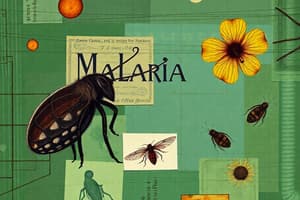Podcast
Questions and Answers
What is Toxoplasma gondii?
What is Toxoplasma gondii?
- A virus that causes respiratory infections
- A type of bacteria that causes pneumonia
- A fungus that causes skin infections
- A parasite that can infect humans and animals (correct)
What is the primary mode of transmission for Toxoplasma gondii?
What is the primary mode of transmission for Toxoplasma gondii?
- Through airborne transmission
- Through a vector such as a mosquito
- Through direct contact with an infected person
- Through contaminated food and water (correct)
Which of the following is a potential complication of Toxoplasma gondii infection?
Which of the following is a potential complication of Toxoplasma gondii infection?
- Respiratory failure
- Cardiovascular disease
- Vision loss (correct)
- Neurological disorders
Who is most susceptible to severe Toxoplasma gondii infection?
Who is most susceptible to severe Toxoplasma gondii infection?
What is the typical treatment for Toxoplasma gondii infection?
What is the typical treatment for Toxoplasma gondii infection?
What is the primary host of Toxoplasma gondii?
What is the primary host of Toxoplasma gondii?
How does Toxoplasma gondii infection typically occur in humans?
How does Toxoplasma gondii infection typically occur in humans?
What is the stage of Toxoplasma gondii that is infectious to humans?
What is the stage of Toxoplasma gondii that is infectious to humans?
What is the characteristic of Toxoplasma gondii infection in immunocompetent individuals?
What is the characteristic of Toxoplasma gondii infection in immunocompetent individuals?
Why is Toxoplasma gondii infection a concern for pregnant women?
Why is Toxoplasma gondii infection a concern for pregnant women?
Flashcards are hidden until you start studying
Study Notes
Toxoplasma gondii
- Toxoplasma gondii is a parasitic protozoan that can infect a wide range of warm-blooded animals, including humans.
Mode of Transmission
- The primary mode of transmission is through ingestion of contaminated food or water, or by handling contaminated cat feces or litter.
Complications
- Potential complication of Toxoplasma gondii infection includes choroidoretinitis, which is an inflammation of the eye that can cause vision loss.
Susceptibility
- Pregnant women, individuals with weakened immune systems (such as those with HIV/AIDS or cancer), and the elderly are most susceptible to severe Toxoplasma gondii infection.
Treatment
- The typical treatment for Toxoplasma gondii infection involves a combination of antiparasitic medications, such as pyrimethamine and sulfadiazine, and folinic acid to reduce the risk of side effects.
Toxoplasma gondii
- Toxoplasma gondii is a parasitic protozoan that can infect humans and animals.
Transmission and Infection
- Primary mode of transmission: ingestion of contaminated food or water, or through contact with cat feces or contaminated soil.
- Infection can occur in humans through:
- Ingestion of undercooked meat or contaminated food and water.
- Contact with cat feces or contaminated soil.
- Mother-to-fetus transmission during pregnancy.
Complications and Susceptibility
- Potential complication: encephalitis (brain infection) and eye problems.
- Most susceptible to severe infection: immunocompromised individuals, such as those with HIV/AIDS, and pregnant women.
Treatment and Host
- Typical treatment: antiparasitic drugs, such as spiramycin or pyrimethamine.
- Primary host: domestic cats and other felines.
Infection Characteristics
- Infectious stage to humans: oocysts, which are resistant to environmental stress and can survive for months.
- Characteristic in immunocompetent individuals: often asymptomatic, but may cause mild flu-like symptoms.
Pregnancy and Concerns
- Concern for pregnant women: risk of mother-to-fetus transmission, which can cause birth defects and miscarriage.
Studying That Suits You
Use AI to generate personalized quizzes and flashcards to suit your learning preferences.




